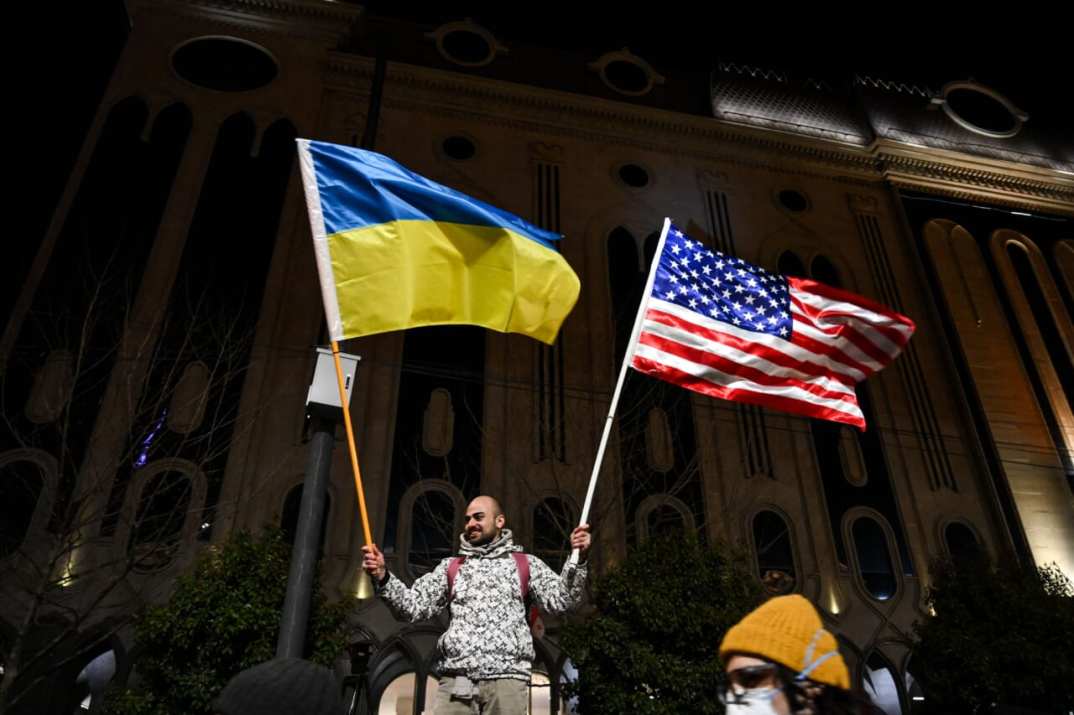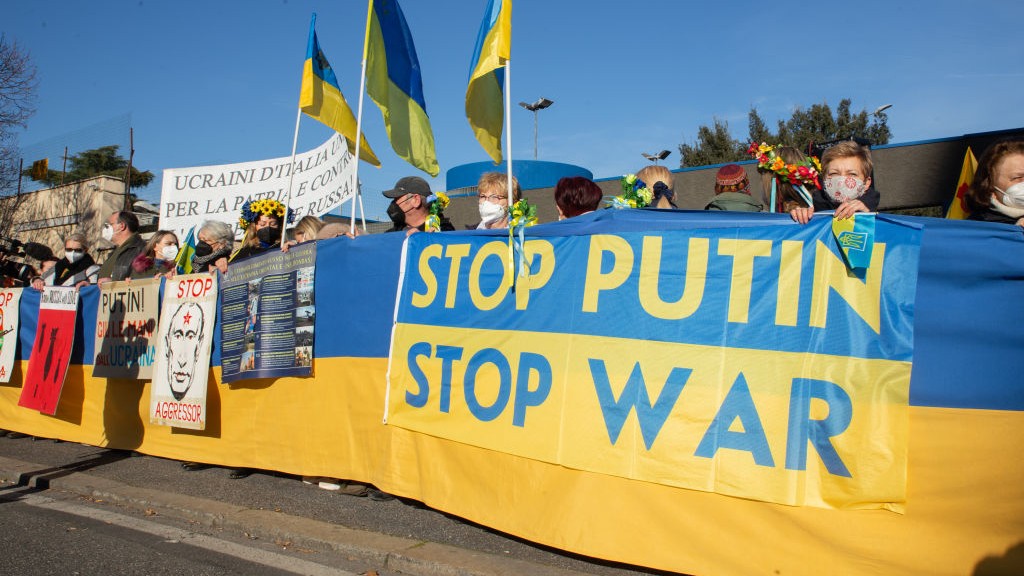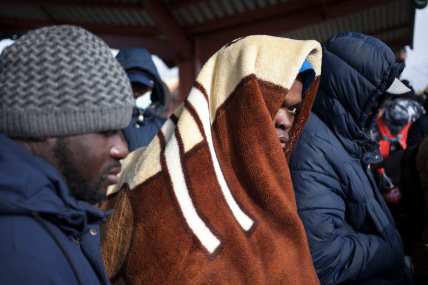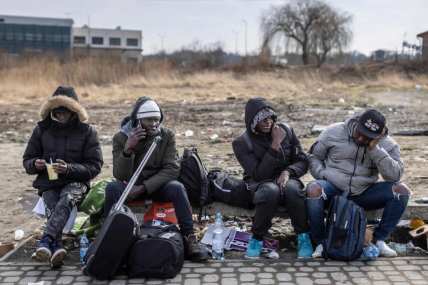What the war in Ukraine could really mean for Black Americans
OPINION: In addition to increased prices at the gas pump and the dinner table, we should be prepared that Putin may once again try to exploit U.S. racial divisions in the upcoming elections like he did in 2016 and 2020.

Make no mistake: The world changed on Feb. 24. Since Russia invaded Ukraine, the world has rallied around its citizens and its fighting president, Volodymyr Zelensky, while isolating Russian President Vladimir Putin financially and reputationally. The international community finally understands that Putin will commit to extreme action, and now leaders are faced with dealing with a desperate and disgraced Putin who happens to own the largest stockpile of nuclear weapons in the world.
We are in game-changing times; the world is reordering as I type this sentence. But what does this mean domestically, and will the lives of Black people be negatively or positively affected? As my identity as a Black woman intersects with my professional identity as an international relations-focused political scientist in this stark moment, I can tell you that a cycle of impact occurs during major global shifting. What I mean is the domestic instability exhibited on Jan. 6, 2021 triggered global instability.
For example, Russia felt emboldened to invade Ukraine because it viewed the United States as weak, divided and vulnerable. Once Russia invaded Ukraine, global instability exacerbated domestic problems, such as increasing gas prices during a time when we’re still in a pandemic, dealing with rising inflation, increased housing prices and growing homeless populations, all while we’re fighting to preserve voting rights. Not to mention that many military families of color are sending loved ones off to support North Atlantic Treaty Organization (NATO) forces. So yes, with Black people still reeling from lost wages and jobs during COVID19, parents struggling with childcare, plus increased costs at the grocery store, the financial impact of this war will be felt at the dinner table and the gas pump. In addition to price hikes on gas and wheat, disinformation campaigns will increase and continue to target Black communities on social media.

On Feb. 21, Putin recently expressed in a speech his longing for the former Soviet Union to be reunited and how dissolving it was a huge mistake. This point is critical to understand because it frames Putin’s anti-Western democracy outlook. It’s this perspective that motivates Putin to use every tool available to him. Considering Russia’s economy ($1.48 trillion) is smaller than Italy’s ($1.87 trillion) and the state of California ($3.35 trillion), hacking, launching denial of services cyberattacks and deploying intentional disinformation campaigns on social media are cost-effective methods Russia uses to its advantage. The runup to the 2016 and 2020 presidential campaigns is where disinformation, an intentional distribution of inaccurate information, was unleashed on the Black community.
The goal of disinformation campaigns on social media is to sow doubt and convince Black Americans not to vote. The 2020 presidential campaign was a record-breaking election in terms of Black voter turnout, which was 62.6 percent, according to the Brennan Center. This reality increases the likelihood that Black Americans will continue to get fed disinformation, especially about the war in Ukraine. A key military strategy is to gain public support by winning over hearts and minds. Imagine an opposite scenario where Black American voters decide it was a mistake for President Biden to support Ukraine and rally NATO to their defense. If Black voters buy into that narrative, that record high of 62.6 percent can be gutted. Data companies like the defunct Cambridge Analytica know Black voters are savvy on social media, making the favored communication tool an ideal environment to spread disinformation and misinformation.
The possibility of disinformation campaigns has implications for the upcoming midterms and 2024 presidential election, two elections that will determine if America remains a democracy or inches closer to autocratic, dictatorial rule. Under autocratic rule, which is usually fueled by strong nationalism and ethnocentric views, underrepresented groups are systematically oppressed by policies designed to limit job options, suppress languages and erase cultures. Before Ukraine got its independence in 1991 from the former Soviet Union, Ukrainians were forced to ignore their culture and language, plus bear the indignity of being treated like Russian colonists, a reality Kenyan ambassador to the U.N., Martin Kimani, echoed in a scathing critique of Russia invading Ukraine.
Here’s some good news, though. With Putin illegally invading Ukraine, the pro-Russian sentiment coming from the American right has aligned its movement with an anti-democratic war criminal. This has two positive consequences: It fills in more detail about what the goals of the “Big Lie” folks are, and it forces people claiming to be patriots to denounce democracy in favor of autocracy. In other words, Putin’s war weakens the right’s momentum.
Another positive consequence is President Joe Biden rallied the world against Putin. This is a strategic win for America’s tainted reputation as a trusted global leader following the Trump years and policies of isolation, Jan 6, 2021, and the chaotic withdrawal from Afghanistan. If the Biden administration continues to unite and strengthen security alliances, this will have a positive impact on the U.S. economy, especially at the dinner table and at the gas pump.
Russia is well-integrated into the international trading system, especially in Europe. Russia is now economically frozen out of the international community in terms of exporting its gas, trading with other countries, accessing banks and offloading its wheat and seed exports. The U.S. imports these basic food goods from Russia. Adding to the problem is, Ukraine and Russia are responsible for exporting 75 percent of the world’s sunflower oil and war is disrupting Ukraine’s ability to export those goods. As the war rages in Ukraine and new trading partners are identified, gas prices will hike up and the price of wheat-based products will increase while we’re still dealing with supply chain problems. Disinformation campaigns targeting Black Americans and the larger diaspora will continue. The key to surviving disinformation is to read different sources to distinguish between propaganda versus facts. Stay tuned, Black America, and stay informed because we all have a stake in this democracy.

Nola Haynes is an international relations-focused political scientist and national security and foreign policy contributor. Nola’s research centers on traditional and non-traditional threats, sanctions, WMD in space, strategic competition and intersectionality. Most recently, Nola published a paper with New America on anti-racism as foreign policy. She was recently named one of the top 50 leaders in national security and foreign affairs by the Center for Strategic and International Studies (CSIS) and Diversity in National Security (DINSN). She is the Director of the West Coast chapter of Women of Color Advancing Peace and Security (WCAPS) and sits on several boards including, the Women’s Caucus for the International Studies Association communications team (WCIS), Foreign Policy board for American Political Science Association (APSA) and ISA West and is an alumnus of the WestExec Advisors mentoring program. As a member of the Pacific Council on International Policy (PCIC), Nola works as an Ops Coordinator to help resettle Afghan allies with Evacuate Our Allies (EOA), is a policy advocate for the Afghan Adjustment Act and is a mentor for the PCIC Amplify Program. Nola has over ten years of experience working in Diversity, Equity, Inclusion and Accessibility (DEIA) and is a proud New Orleans native, vegan-adjacent, dog mom, yogi and hiker. Nola’s traveled extensively, conducted research in West Africa and Central America on the intersections of terrorism, religion, gender, crisis and conflict. Nola holds degrees from UCLA, Harvard Divinity School and USC and is a regular guest on MSNBC and the Black News Channel (BNC) discussing foreign policy and national security-related issues, particularly Russia and Ukraine.


